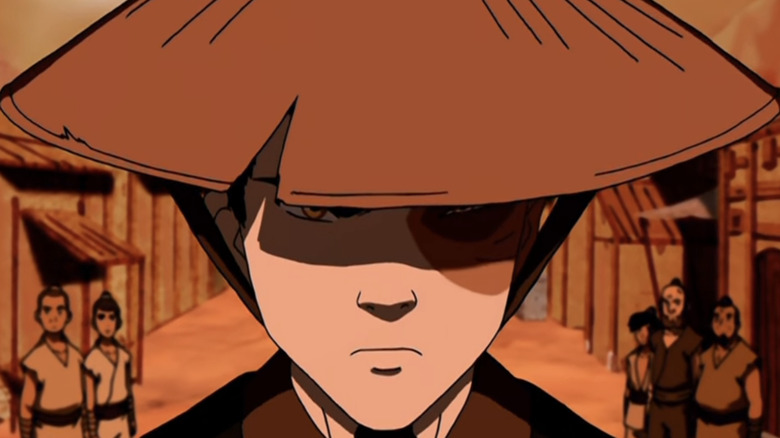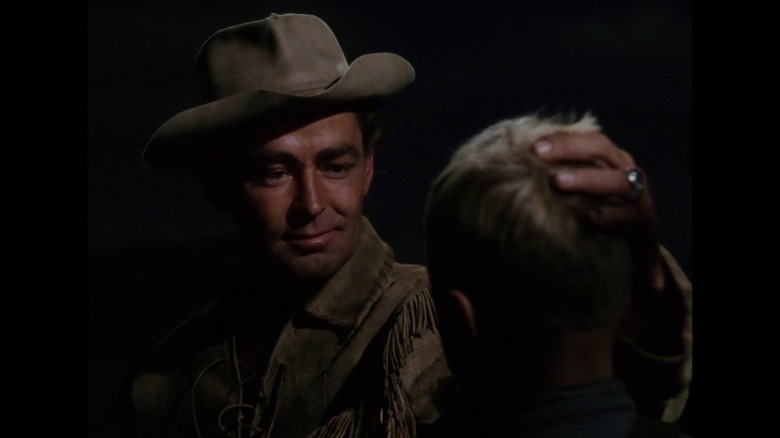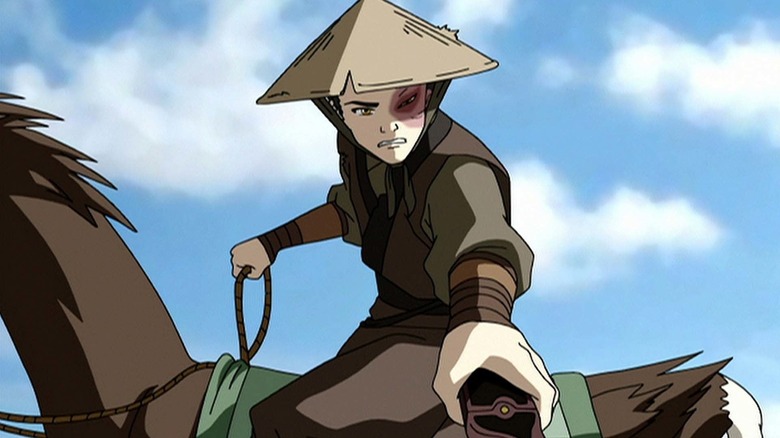One Episode Of Avatar: The Last Airbender Remade A Classic Western
It's hard to find a TV series more beloved than "Avatar: The Last Airbender." Unlike some fandoms out there, the "Avatar" audience lives in shared adoration of the show — as harmonious as the four nations of water, earth, fire, and air once were. There are 61 "Avatar" episodes split across three seasons (or "Books"). Of those, season 2 "Zuko Alone" is often singled out as one of the best, if not the best, of the whole show. "Avatar" sequel "The Legend of Korra" even did a spiritual follow-up: "Korra Alone." The exiled prince of the Fire Nation, Zuko (Dante Basco) is introduced in season 1 hunting Avatar Aang (Zach Tyler Eisen). In season 2, Zuko falls even lower, losing even the meager resources he previously had. He has to put his Avatar hunt on pause because the Fire Nation is hunting him too.
"Zuko Alone" (directed by Lauren MacMullan, written by Elizabeth Welch) is both a standalone episode and one that cannot be skipped. It's pivotal to Zuko's past and future. True to its name, he's the only main character who appears. Team Avatar are no shows, and Zuko had parted ways with his uncle Iroh (Mako) in an earlier episode, "Avatar Day."
Traveling alone on ostrich-horseback, Zuko comes to a small Earth Kingdom village. He saves a boy named Lee (Robby Bruce) from a gang of soldiers extorting the town. That earns him an invite to Lee's family's farm, where Zuko stays and reflects on his past. The episode underlines how Zuko is a good person at his core, but also scarred by his violent culture and abusive family.
If Zuko's story sounds familiar, it should, because it's homaging the 1953 western "Shane." Set in 1880s Wyoming, the titular gunfighter (Alan Ladd) looks for a new life as a farmhand to the local Starrett family. Local property disputes, though, force Shane to pick his gun back up. In "Shane," little Joey Starrett (Brandon deWilde) admires Shane more than he does his own father, the same way Lee admires Zuko. In both stories, this isn't a friendship made to last.
Zuko Alone retells the western film Shane
"Avatar: The Last Airbender" modeled its worldbuilding on Southeast Asian culture (the different bending styles are based on real martial arts, for instance). The creators' love for anime and wuxia films seeps through every frame of the show. But "Avatar" is an American series, and filled with American cultural references. "The Chase," the episode following "Zuko Alone," features a relentless pursuit right out of a different Western classic: "Butch Cassidy and the Sundance Kid."
"Zuko Alone," though, is without a doubt the "Avatar" episode that's most like a Western picture. The episode opens with Zuko riding a horse through a prairie like a lone cowboy. His straw hat even suggests a cowboy's hat. Then the last shot of the episode is Zuko, again on horseback, riding off and turned into a silhouette by the sunset. In between that, Zuko faces down the Earth Kingdom gang in the middle street of the town — the archetypal setting for a Western duel, even if Zuko fights with swords and not guns.
Now, there's a big structural difference between "Zuko Alone" and "Shane." The former cuts between the present and flashbacks to Zuko's childhood. "Shane" has no such flashbacks, or even exposition, to what Shane did in the days before. We don't know Shane's past, whereas the episode is all about exploring Zuko's. To Lee and the other villagers, Zuko is as mysterious a man as Shane is, but the audience knows differently.
What unites the stories again is similar themes about violence and how it is passed down. Before leaving Lee's family, Zuko gives the boy a knife. Inscribed with "never give up without a fight," Zuko has carried the knife as a reminder of his resolve. But after he leaves, Lee tries to use the knife to fight off some soldiers and gets kidnapped. Zuko going back to save Lee is him cleaning up his own mistake.
In Shane and Zuko Alone, violence burns and scars like fire
Throughout "Shane," Shane is wary of Joey admiring him too much. After becoming (what appears to be) his old self again to rid the valley of some black hats, Shane leaves, his last words to Joey being a warning: "There's no living with a killing. There's no going back from one. Right or wrong, it's a brand. A brand sticks. There's no going back."
In "Zuko Alone," Zuko reveals his firebending and true self in a moment of pride for his victory. That truth makes the townspeople, Lee included, reject him. He rides off like Shane did, but Lee isn't pleading that he come back. Zuko is still doing the best thing he could which, like Shane, was to leave and take the violence with him. Zuko's own people are the ones who started the cycle of violence; unlike Shane (who may or may not be dead when the credits roll), Zuko still has the time to become a better man, and he eventually does. His experience with Lee was a small step on that journey that became a big one.
The legacy of "Shane" looms large. Clint Eastwood had already semi-remade it in 1985 as "Pale Rider." You can also see its influence on Eastwood's "Unforgiven." Compare Shane's last words to William Munny (Eastwood) saying, "It's a hell of a thing killing a man."
James Mangold's "Logan" sent off Hugh Jackman's Wolverine in 2017 with a story modeled after "Shane." (The characters in "Logan" watch "Shane" and quote it afterwards.) "Logan" reintroduced "Shane" to a younger generation of moviegoers, but many of that generation had already seen the story of "Shane" play out a decade earlier in "Zuko Alone."


